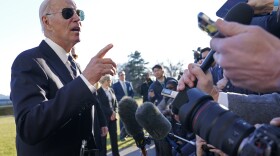The governor of Washington state declared a state of emergency Saturday after a man died there of COVID-19, marking the first such reported death in the United States.
Gov. Jay Inslee directed state agencies to use “all resources necessary” to prepare for and respond to the outbreak. The declaration also allows the use of the Washington National Guard, if necessary.
“We will continue to work toward a day where no one dies from this virus," the governor vowed.
Health officials in California, Oregon and Washington state worried about the novel coronavirus spreading through West Coast communities after confirming at least three patients were infected by unknown means. The patients had not visited an area where there was an outbreak, nor apparently been in contact with anyone who had.
Washington state officials issued a terse news release announcing the death there, gave no details and scheduled a news conference. A spokesperson for EvergreenHealth Medical Center, Kayse Dahl, said the person died in the facility in the Seattle suburb of Kirkland, but gave no other details.
Dr. Jeffrey Duchin, a Seattle and King county health official who works with the U.S. Centers for Disease Control and Prevention, said the person who died was a man in his 50s.
President Donald Trump described the person as having a high medical risk. He said healthy Americans should be able to recover if they contract the new virus.
Washington state and King County health officials said “new people (have been) identified with the infection, one of whom died.” They did not say how many new cases there are.
Amy Reynolds of the Washington state health department said in a brief telephone interview: “We are dealing with an emergency evolving situation.”
The number of coronavirus cases in the United States is considered small. But convinced that the number of cases will grow, health agencies are ramping up efforts to identify those who might be sick.
The California Department of Public Health said Friday that the state will receive enough kits from the CDC to test up to 1,200 people a day for the COVID-19 virus — a day after Gov. Gavin Newsom complained to federal health officials that the state had already exhausted its initial 200 test kits.
Oregon was able to more quickly identify a case — an employee of an elementary school near Portland — because it was able to test a sample locally.
The U.S. has about 60 confirmed cases. Worldwide, the number of people sickened by the virus hovered Friday around 83,000, and there were more than 2,800 deaths, most of them in China.
Most infections result in mild symptoms, including coughing and fever, though some can become more serious and lead to pneumonia. Older people, especially those with chronic illnesses such as heart or lung disease, are especially vulnerable. Health officials think it spreads mainly from droplets when an infected person coughs or sneezes, similar to how the flu spreads.
The patients — two in California, a high school student in Everett, Washington, and an employee at a Portland, Oregon-area school — hadn’t recently traveled overseas or had any known close contact with a traveler or an infected person, authorities said.
Earlier U.S. cases include three people who were evacuated from the central China city of Wuhan, epicenter of the outbreak; 14 people who returned from China, or their spouses; and 42 American passengers on the Diamond Princess cruise ship, who were flown to U.S. military bases in California and Texas for quarantining.
The U.S. government looked at sending dozens of Californians, several of whom tested positive for the virus, who had been aboard the cruise ship to a state-owned facility in Costa Mesa, California. Local officials objected, saying they weren't included in the planning and wanting to know what safeguards would be in place to prevent spread of the virus. The U.S. government said it didn't need to use the facility after all.
At UC Davis Medical Center in California, at least 124 registered nurses and other health care workers were sent home for “self-quarantine" after a Solano County woman with the virus was admitted, National Nurses United, a nationwide union representing registered nurses, said Friday.
The case “highlights the vulnerability of the nation’s hospitals to this virus," the union said.
Earlier Friday, Oregon confirmed its first coronavirus case, a person who works at an elementary school in the Portland area. The Lake Oswego School District sent a robocall to parents saying that Forest Hills Elementary will be closed until Wednesday so it can be deep-cleaned by maintenance workers.
Washington state health officials announced two other new coronavirus cases Friday night, including a high school student who attends Jackson High School in Everett, said Dr. Chris Spitters of the Snohomish County Health District.
The other case in Washington was a woman in in King County in her 50s who had recently traveled to South Korea, authorities said. Neither patient was seriously ill.
The COVID-19 cases of unknown origin marks an escalation of the worldwide outbreak in the U.S. because it means the virus could spread beyond the reach of preventative measures like quarantines.
Federal officials think the coronavirus is spread only through “close contact, being within 6 feet of somebody for what they’re calling a prolonged period of time,” said Dr. James Watt, interim state epidemiologist at the California Department of Public Health.




